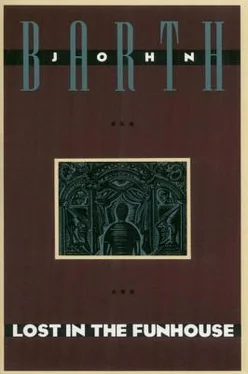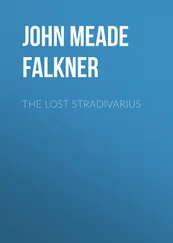John Barth - Lost in the Funhouse
Здесь есть возможность читать онлайн «John Barth - Lost in the Funhouse» весь текст электронной книги совершенно бесплатно (целиком полную версию без сокращений). В некоторых случаях можно слушать аудио, скачать через торрент в формате fb2 и присутствует краткое содержание. Год выпуска: 2014, ISBN: 2014, Издательство: Knopf Doubleday Publishing Group, Жанр: Современная проза, на английском языке. Описание произведения, (предисловие) а так же отзывы посетителей доступны на портале библиотеки ЛибКат.
- Название:Lost in the Funhouse
- Автор:
- Издательство:Knopf Doubleday Publishing Group
- Жанр:
- Год:2014
- ISBN:978-0-8041-5250-1
- Рейтинг книги:3 / 5. Голосов: 1
-
Избранное:Добавить в избранное
- Отзывы:
-
Ваша оценка:
- 60
- 1
- 2
- 3
- 4
- 5
Lost in the Funhouse: краткое содержание, описание и аннотация
Предлагаем к чтению аннотацию, описание, краткое содержание или предисловие (зависит от того, что написал сам автор книги «Lost in the Funhouse»). Если вы не нашли необходимую информацию о книге — напишите в комментариях, мы постараемся отыскать её.
Lost in the Funhouse — читать онлайн бесплатно полную книгу (весь текст) целиком
Ниже представлен текст книги, разбитый по страницам. Система сохранения места последней прочитанной страницы, позволяет с удобством читать онлайн бесплатно книгу «Lost in the Funhouse», без необходимости каждый раз заново искать на чём Вы остановились. Поставьте закладку, и сможете в любой момент перейти на страницу, на которой закончили чтение.
Интервал:
Закладка:
What relevance does the war have to the story? Should there be fireworks outside or not?
Ambrose wandered, languished, dozed. Now and then he fell into his habit of rehearsing to himself the unadventurous story of his life, narrated from the third-person point of view, from his earliest memory parenthesis of maple leaves stirring in the summer breath of tidewater Maryland end of parenthesis to the present moment. Its principal events, on this telling, would appear to have been A, B, C , and D.
He imagined himself years hence, successful, married, at ease in the world, the trials of his adolescence far behind him. He has come to the seashore with his family for the holiday: how Ocean City has changed! But at one seldom at one ill-frequented end of the boardwalk a few derelict amusements survive from times gone by: the great carrousel from the turn of the century, with its monstrous griffins and mechanical concert band; the roller coaster rumored since 1916 to have been condemned; the mechanical shooting gallery in which only the image of our enemies changed. His own son laughs with Fat May and wants to know what a funhouse is; Ambrose hugs the sturdy lad close and smiles around his pipestem at his wife.
The family’s going home. Mother sits between Father and Uncle Karl, who teases him good-naturedly who chuckles over the fact that the comrade with whom he’d fought his way shoulder to shoulder through the funhouse had turned out to be a blind Negro girl — to their mutual discomfort, as they’d opened their souls. But such are the walls of custom, which even. Whose arm is where? How must it feel. He dreams of a funhouse vaster by far than any yet constructed; but by then they may be out of fashion, like steamboats and excursion trains. Already quaint and seedy: the draperied ladies on the frieze of the carrousel are his father’s father’s mooncheeked dreams; if he thinks of it more he will vomit his apple-on-a-stick.
He wonders: will he become a regular person? Something has gone wrong; his vaccination didn’t take; at the Boy-Scout initiation campfire he only pretended to be deeply moved, as he pretends to this hour that it is not so bad after all in the funhouse, and that he has a little limp. How long will it last? He envisions a truly astonishing funhouse, incredibly complex yet utterly controlled from a great central switchboard like the console of a pipe organ. Nobody had enough imagination. He could design such a place himself, wiring and all, and he’s only thirteen years old. He would be its operator: panel lights would show what was up in every cranny of its cunning of its multifarious vastness; a switch-flick would ease this fellow’s way, complicate that’s, to balance things out; if anyone seemed lost or frightened, all the operator had to do was.
He wishes he had never entered the funhouse. But he has. Then he wishes he were dead. But he’s not. Therefore he will construct funhouses for others and be their secret operator — though he would rather be among the lovers for whom funhouses are designed.
ECHO
One does well to speak in the third person, the seer advises, in the manner of Theban Tiresias. A cure for self-absorption is saturation: telling the story over as though it were another’s until like a much-repeated word it loses sense. There’s a cathartic Tiresias himself employs in the interest of objectivity and to rid himself of others’ histories — Oedipus’s, Echo’s — which distract him fore and aft by reason of his entire knowledge.
Narcissus replies that the prescription is unpalatable, but he’s too weary of himself not to attempt it. Where to begin. The prophet’s cave seems a likely place, which he stumbles into one forenoon in flight from his admirers. What started as a stag-hunt has turned into yet another love-chase, led this time by a persisting nymph soon joined by her quarry’s companions. It wants all the Narcissan craft, resentfully perfected, yet again to mislead the lot.
An imperfectly dark passage. Outside his ardentest suitor calls, pederast Ameinius, spurned. The nymph soft-seconds his bugger woo. Chaste Narcissus shivers, draws farther in, loses bearings, daresn’t call, weeps. The life-long bother! Seized he gives shriek, is released. How come? What next? Hadn’t he as well have his blossom plucked? Who says so?
Tiresias the prophet. What’s he doing here? Conversing with Narcissus. How does he know — because he knows everything. Why isn’t he in Thebes? For the reason that, as during a prior and a posterior extravagance of his, Thebes is enjoying an interregnum, hard on prophets. First there was the sphinx, whose elementary riddle was none of his affair; he withdrew to the Thespian cave, there acted as adviser to the blue nymph Leirope, Narcissus’s mother. The current pass is sorer: Oedipus’s tragedy, too awful to rehearse. The third and last, couple hundred months hence, darker yet from Tiresias’s point of view.
Narcissus reflects that after years of elusion he’s at the seer’s mercy, rapewise. He wonders which is more ironic, seeking refuge for innocence where it mightn’t be preserved or falling into the first hands he’s ever seemed to leave cold. Thus rare Tiresiases.
Apostrophe.
Some are comelier than most, a few handsome; it’s Narcissus’s fate, through fault nor merit of his own, to be beautiful beyond enduring. The first catch eye, the second turn head; Narcissus like a fleshed theophany smites the whole sense. A philosopher argues that perceptible beauty is ipso facto less desirable than im — at glimpse of Narcissus he interrupts, forswears himself. A man doubtless of his virility admits what he’d sooner not: in one extraordinary case he’s felt the catamitic itch. A woman indifferent thitherto to the world’s including handsomer men than hers finds Narcissus so so she’s cross with her lover. Thus the mature, who see to it that sight of the wonder doesn’t linger or recur and so in most cases come to terms with memory: the philosophers resume their position, men manliness, women men — all chastened, one supposes, by an exception so exceptional it ruins their rules. Among the less disciplined and wise, astonishment yields to simple lust. Cynical, powerful, wanton, uncommitted, passionate, impulsive set out to have their will. Hosts of ordinary, too, strangers to emotion of extraordinary kind or force, are seized as by conversion. Snares are laid, gifts tendered, pitfalls dug. His very wetnurse, Leirope says, took liberties with her suckling, tutor tutee. Leirope herself — how was it? Undone by a meandering river-god she seeks the caved seer first. What counsel does he offer? Tiresias won’t repeat it; enough to say it’s of a kind with what he wishes he’d given Oedipus. The varieties of general good advice are few. Leirope suggests herself to Narcissus when he reaches young manhood and begs him to ignore her advice: take to the woods! Into the bimboed and bebuggered bush he flies, where ladies beckon every way and gentlemen crouch in ambuscado.
All this considered, one may wonder at Tiresias’s immunity, unless indeed he’s cat-and-mousing. Is he too ravished by his victim to recollect himself for rape? Floored for defloration? No no. Clairvoyance is anaphrodisiac. One recalls too: Tiresias has been without sex for a long time. What’s more he’s blind as a bat, otherwise he couldn’t see so in the cave.
Is Narcissus piqued or relieved? Both know. He presently inquires how one in his position might best fend the world’s importune. Why fend? Tiresias’s story is to the point. And Echo’s. Echo’s? A nymph possessed so early and entirely by Pan that her subsequent affairs seem redundant. Afflicted with immortality she turns from life and learns to tell stories with such art that the Olympians implore her to repeat them. Others live for the lie of love; Echo lives for her lovely lies, loves for their livening. With her tongue-tried tales she amuses others and preserves her reason; but Zeus employs her, unawares, to beguile his wife while he makes free with the mountain-nymphs. Again again, begs the queen of heaven; another mount’s climbed with each retelling. At fiction’s end the facts are clear; Zeus unpunishable, Echo pays. Though her voice remains her own, she can’t speak for herself thenceforth, only give back others’ delight regardless of hers.
Читать дальшеИнтервал:
Закладка:
Похожие книги на «Lost in the Funhouse»
Представляем Вашему вниманию похожие книги на «Lost in the Funhouse» списком для выбора. Мы отобрали схожую по названию и смыслу литературу в надежде предоставить читателям больше вариантов отыскать новые, интересные, ещё непрочитанные произведения.
Обсуждение, отзывы о книге «Lost in the Funhouse» и просто собственные мнения читателей. Оставьте ваши комментарии, напишите, что Вы думаете о произведении, его смысле или главных героях. Укажите что конкретно понравилось, а что нет, и почему Вы так считаете.












